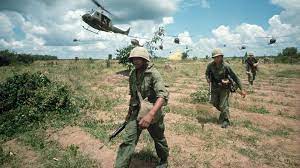The Vietnam War was one of the most controversial events in American history. It lasted for almost two decades, claiming the lives of more than 58,000 Americans and countless Vietnamese civilians. Despite its high human and financial cost, the war failed to achieve its objectives and left a deep scar on the nation’s psyche. Today, as we reflect on the current political climate in the United States, it’s hard not to draw parallels between the two.
In both cases, a generation of young Americans were forced into an unideal situation that was unnecessary and selfishly started by greedy and careless politicians. During the Vietnam War, politicians sold the American public on a misguided belief that the conflict was necessary to stop the spread of communism in Southeast Asia. In reality, the war was driven by a combination of Cold War ideology, geopolitical interests, and economic incentives. The Johnson administration, in particular, was eager to escalate the conflict in order to demonstrate its resolve against communism and boost its chances in the upcoming presidential election.
Similarly, in today’s political climate, politicians on both sides of the aisle have become more concerned with their own interests than with the welfare of the American people. The endless partisan bickering and political gridlock have left many Americans feeling disillusioned and frustrated. The failure to pass meaningful legislation on issues such as healthcare, climate change, and immigration has left millions of people in limbo and deprived them of basic human rights. The inability to work together in a constructive manner has weakened American democracy and undermined its global standing.
One of the most striking similarities between the Vietnam War era and today is the divisiveness of the political discourse. During the 1960s and 1970s, the country was deeply divided over the war, with anti-war activists on one side and supporters of the war on the other. The war created a generation gap between young people and their elders, with many young Americans protesting against the government’s policies and risking arrest, injury, and even death.
Today, we are witnessing a similar level of polarization and division, with Democrats and Republicans unable to find common ground on almost any issue. The political discourse has become increasingly toxic, with personal attacks, misinformation, and propaganda replacing reasoned debate and fact-based analysis. The rise of social media and digital communication has only amplified these trends, creating echo chambers where people are more likely to be exposed to information that confirms their existing beliefs rather than challenging them.
Despite these similarities, there are also important differences between the Vietnam War era and today. For one thing, the stakes of the current political climate are less clear-cut than they were during the Cold War. The Vietnam War was fought against a clear enemy, the spread of communism, which was seen as a threat to American democracy and freedom. In contrast, the issues of today are more complex and nuanced, and there is often no easy solution that will satisfy everyone.
The political landscape has shifted significantly since the 1960s and 1970s. The rise of identity politics, the increasing role of money in politics, and the proliferation of media outlets have all contributed to a more fragmented and unpredictable political landscape. The traditional parties have lost much of their appeal, and a growing number of Americans identify as independents or members of third parties. This has created new opportunities for outsiders and mavericks to enter the political arena, but has also made it harder for politicians to build consensus and achieve lasting change.
Ultimately, the parallels between the current political climate in the United States and the Vietnam War era are hard to ignore. Both were marked by greed, polarization, and a failure of leadership. However, there are also important differences between the two eras, and it is up to us as citizens to learn from the past


Great read! Never thought about it like this!